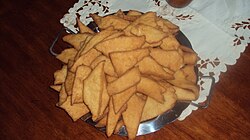| This article needs additional citations for verification. Please help improve this article by adding citations to reliable sources. Unsourced material may be challenged and removed. Find sources: "Hojuela" – news · newspapers · books · scholar · JSTOR (December 2012) (Learn how and when to remove this message) |
 | |
| Type | Dessert |
|---|---|
| Place of origin | Spain |
| Region or state | Castile-Manchego |
| Main ingredients | Flour, Eggs, Sugar |
A Hojuela (lit. 'flake'), also called a Hojaldra, is a traditional Spanish and Latin American sweet baked-good originating in Spain. In Latin American countries, especially Colombia, and in Spain, it is commonly made during Holy Week and the Christmas season. Ingredients vary by region, but usually consist of a flour-based batter fried in oil and dusted with sugar.
Colombia
In Colombia, Hojuelas are commonly made during the Holiday season. They are generally eaten along with manjar blanco, natillas, and buñuelos. Hojuelas are typically made with wheat flour, eggs, water, and half a cup or less of orange juice. Strips of the batter are fried in vegetable oil.
Chile
In Chile, hojuelas derive from a traditional recipe using palm syrup.
Spanish saying
"Miel sobre hojuelas" is a Spanish saying analogous to the English expression "Icing on the cake". Supposedly, the expression emerged when people added honey over hojuelas rather than sugar, and enjoyed the taste even more. It means something akin to making something good even better.
Alternatively, saying "No todo es miel sobre hojuelas, or "Not everything is honeyed hojuelas", means "It is not all fun and games".
See also
- Fazuelos (Sephardic Jewish pastry, sometimes also referred to as "hojuelas")
References
- ^ Dinho, Erica (2022-11-22). "Hojuelas o Hojaldras Colombianas (Colombian Hojuelas)". My Colombian Recipes. Retrieved 2024-11-30.
- Juan Salanova. Dicionario de Dichos y Frases Hechas. Juan Salanova. p. 174. ISBN 978-84-609-4705-9. Retrieved 16 December 2012.
- The Everything European Travel Phrase Book: A Bundle of Spanish, Italian, French, and German Translations. Adams Media. 31 October 2010. pp. 152–. ISBN 978-1-4405-1258-2. Retrieved 16 December 2012.